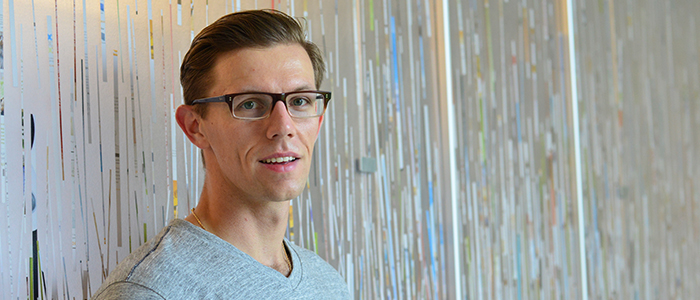Varsity rower makes waves in and out of the water

By Jesica Hurst, BA'14
For some, the idea of balancing a rigorous athletic schedule while completing a PhD in biochemistry would seem intimidating, if not impossible. For Adam Rabalski, it’s the only way he knows how to keep a perfect balance between his two passions: research and rowing.
The PhD candidate has not only managed to balance a busy schedule, but has also succeeded in making a name for himself in both areas. From representing Schulich Medicine & Dentistry at the Canadian Student Health Research Forum in Winnipeg, to helping his team bring home the gold at the 2013 Canadian University Rowing Championships, the young scholar and dedicated athlete is making waves in and out of the water.
Rabalski sat down with us to talk about why he moved from Guelph to London, what excites him about his current research, and what he enjoys most about his sport of choice.
Where were you born and raised, and what is your education background?
I was born and raised in Guelph, Ontario. I completed an Honors Bachelor of Science degree in Biological and Biomedical Sciences at the University of Guelph, and I’m currently a PhD Candidate in the Department of Biochemistry at Schulich Medicine & Dentistry.
With such strong roots in Guelph, what made you want to come to Schulich Medicine & Dentistry?
I attended a lecture at the University of Guelph given by my current supervisor, David Litchfield, PhD. Through his talk, I became really interested in the research that he presented, particularly the regulation of signaling pathways controlling apoptosis and cell survival.
Upon visiting Schulich Medicine & Dentistry and speaking with other trainees, I decided to make the switch because of the collaborative research environment and the technical training opportunities that exist for trainees.
Does your current research project focus on what originally excited you about working with David Litchfield?
My project is focused on using mass spectrometry-based proteomics to study the effect of inhibition of a protein kinase called CK2. CK2 is misregulated in many different types of cancers, and currently there are inhibitors for the protein kinase in clinical trial.
Using clinical stage inhibitors, I can investigate the impact on the phosphoproteome and identify signaling pathways that are influenced by CK2, markers of CK2 inhibition, and potential off-target effects of CK2 inhibitors. Determining biomarkers for disease could possibly translate into more effective therapeutics for a variety of different diseases, including cancer.
What excites you about this area of research?
I’m truly excited by the biochemical information that can be obtained in large-scale mass-spectrometry-based proteomics experiments, as this allows researchers the opportunity to obtain a 'bigger picture' of the signaling pathways in cells under different biological contexts.
With the evolution of bioinformatics approaches to help understand the information obtained, researchers can get a better understanding of the molecular and cellular biology at a systems level. I’m really excited by the potential for applications in personalized medicine.
Do you have any passions outside of the lab?
Throughout my graduate studies, I’ve been a member of the Western Mustangs varsity rowing team. Rowing has been such an integral part of my life for a while now, and I really enjoy the challenge of training and competing.
Training with the team at Western has given be the opportunity to work with world-class coaches, and I’ve represented Western, Ontario and Canada at many different regattas around the world, including the Henley Royal Regatta, Head of the Charles Regatta and, most recently, the World University Rowing Championships.
What extracurricular or volunteer opportunities are you currently involved with?
I have been involved as an activity demonstrator and volunteer with Let’s Talk Science since 2013, and I’ve really enjoyed working with local London schools to bring STEM-related activities to the classroom. I was actually fortunate enough to be a beneficiary of STEM programs at an early age, so I want to do my part in getting youth engaged and interested in science.








